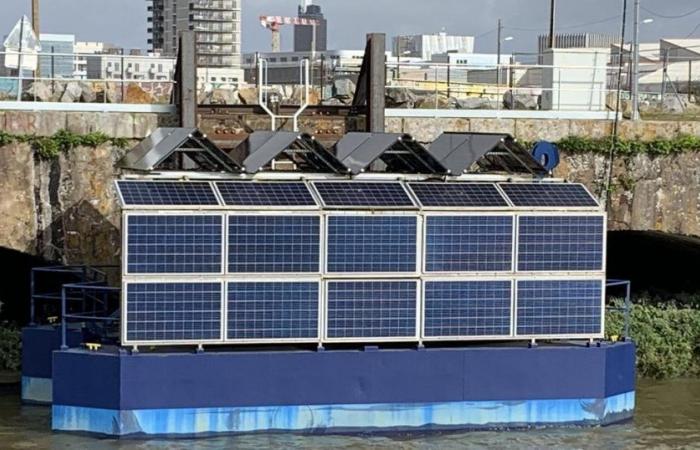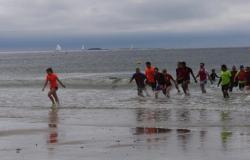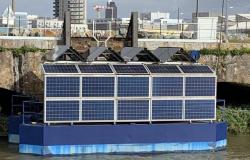
A start-up from Guérande has inaugurated a mobile data center prototype, which uses the freshness of the river’s waters to cool its servers. A way to reduce the carbon and land footprint, and reduce energy consumption.
Le Figaro Nantes
A funny little blue barge has been floating for several days in the gray autumn of Nantes. Seen from the front, the structure evokes a hedgehog without spikes, or a headless siege ram. The animal is of another kind. It is a floating “data center”, a digital data center bathed by the waters of the Loire. Installed since September 25 to the south of the island of Nantes (Loire-Atlantique), Quai Wilson, this prototype – the first of its kind in Europe – was designed by the Guérande start-up Denv-R, specializing in cloud computing technologies – in other words, the “cloud”. It offers insight into a more sustainable approach to digital industries.
Equipped with solar panels, the barge, just under 10 meters long, intends to present a new, more virtuous and less energy-consuming generation of data centers. Usually, a classic “data center” – like those operated by Google, or by the French company OVH – permanently powers servers as well as cutting-edge computer equipment, which generates a lot of heat. To the energy consumed is added that used to cool the systems, through robust ventilation systems – all for hefty final bills. In contrast, the concept imagined by Denv-r relies on a gentler cooling method, based on the waters of the river.
At the crossroads of transitions
“We use a closed-circuit hybrid system, without pumping water from the Loire and without air conditioning, which makes it possible to halve the carbon footprint of the center, compared to a classic model,” explains Maxime Rozier, co-founder with Vincent Le Breton of the Loire company. No risk of drift: installed for six months on an arm of the Loire protected from flooding, the experimental float – designed to be modular by another Guérande company, Geps Techno – was mounted on rails, backed by the Wilson quay, in order to ‘marry the level of the tide and secure its servers as much as possible.
”
data-script=”https://static.lefigaro.fr/widget-video/short-ttl/video/index.js”
>
Also readNantes-Atlantique Airport: in 20 years, more than 2,000 households have received assistance to soundproof their homes
Another argument put forward by the Guérandais: investing in a floating, therefore mobile, data center would make it possible to avoid taking land artificially and making land savings. While betting on proximity. These are all strong points likely to be of interest to local authorities and private companies, while the ever-increasing digital needs are encouraging the proliferation of data centers, of varying sizes, across the region. “Offering smaller data centers is part of an approach to “edge computing” which consists of offering our offer as close as possible to our customers”specify those responsible for Denv-r.
The development of this experimental “data center”, with a power of 200 kilowatts, cost nearly a million euros. A sum contributed by a third by the Pays de la Loire region, which also supported the computer radiator project, developed by Qarnot for the data centers of tomorrow, as well as the “cloud” solutions with a low environmental footprint offered by Hyperion , in Laval (Mayenne). “We are committed to supporting sustainable and innovative projects, which work at the crossroads of ecological, digital and energetic transitions, like Denv-r, which we have been following since the study phase of their center “floating data”indicates Constance Nebbula (LR), vice-president of the Regional Council in charge of digital and innovation. The project is also attracting the interest of the Métropole de Nantes as well as the Grand maritime port of Nantes – Saint-Nazaire, which has made available a location on the quays of the city of dukes for the needs of the prototype. A report on this experiment is expected in the second half of next year.
”
data-script=”https://static.lefigaro.fr/widget-video/short-ttl/video/index.js”
>





